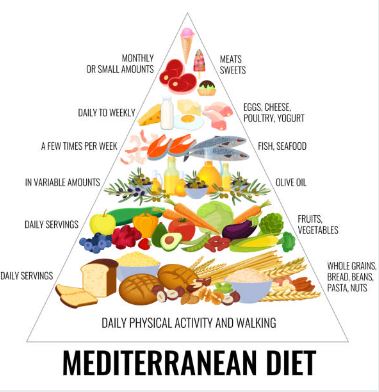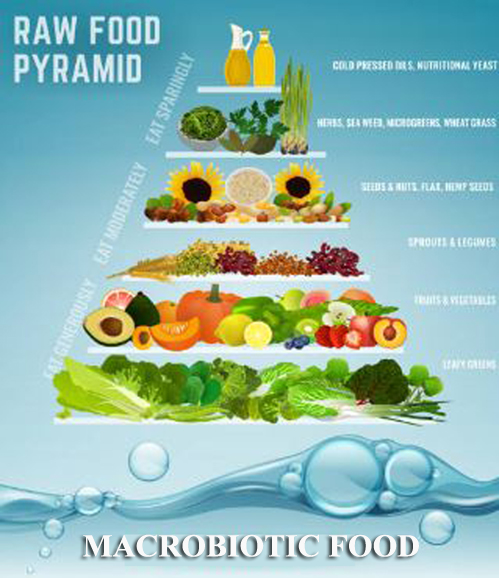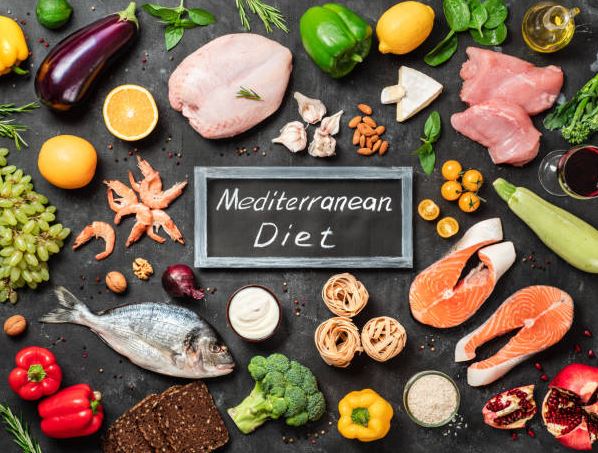The Mediterranean Diet and the Macrobiotic Diet
What is Mediterranean Diet?
The Mediterranean diet is inspired by the eating habits of individuals from Crete, Greece, and Southern Italy. It has gained popularity due to its association with lower rates of heart disease, chronic illnesses, and obesity. The Mediterranean diet promotes the consumption of whole grains, healthy fats such as fish, olive oil, and nuts, as well as an abundance of vegetables, fruits, and fish. It encourages limited consumption of non-fish meats. Additionally, the Mediterranean diet emphasizes the importance of sharing meals with family and engaging in regular physical activity.
The Mediterranean Diet Pyramid:
The updated Mediterranean diet pyramid maintains the same food categories but emphasizes reducing carbohydrate intake due to the sedentary nature of modern lifestyles. Following the new Mediterranean diet pyramid, a sample meal plan could look like this:
Breakfast: Oatmeal topped with walnuts
Snack: Fresh fruit
Lunch: Green salad with olives, chickpeas, and cucumbers
Snack: Assorted nuts
Dinner: Baked cod served with vegetables and a side of couscous

Please note that this is just a sample meal plan, and individuals following the Mediterranean diet can customize it according to their preferences while adhering to the overall principles of the diet.
What is the Macrobiotic Diet?
Contrasting the two approaches, the macrobiotic diet draws inspiration from the eating habits and lifestyles of some of the world’s oldest civilizations. Like the Mediterranean diet, the macrobiotic diet has shown efficacy in promoting heart health, managing chronic diseases, and addressing obesity. The macrobiotic diet emphasizes equal proportions of grains, legumes, vegetables, and fruits/nuts/seeds. Moreover, it encourages the consumption of seasonal and local foods, soups, pickled and fermented foods, natural sweeteners, and mild beverages, while minimizing the intake of animal products.

In contrast to the Mediterranean diet, the macrobiotic approach is considered more than just a diet—it is a lifestyle. Macrobiotics, which means “great life,” utilizes healthy food choices as a means to help individuals achieve balance and harmony in their lives. It encourages mindfulness, connection, and the exploration of healthy patterns through food. By prioritizing their own well-being, individuals practicing macrobiotics can serve as a source of strength, mindfulness, and adaptability for their families, communities, and environments.
The Macrobiotic diet’s food pyramid:
The macrobiotic diet’s food pyramid embodies the significance of establishing structure, daily habits, and harmony to enhance stress management, mental well-being, and physical health. Keeping this in mind, here’s an example of a sample macrobiotic diet meal plan:
Breakfast: Oatmeal topped with steamed greens
Snack: Steamed sweet potatoes
Lunch: Steamed sourdough bread with tahini, sauerkraut, and a side of miso soup with tofu
Snack: Assorted seeds or nuts
Dinner: Pasta primavera served with a side salad

Please note that this is merely a sample meal plan, and individuals following the macrobiotic diet can tailor it to their preferences while adhering to the core principles of the diet.
The Ideal Diet for Optimal Health:
Both the Mediterranean diet and the macrobiotic diet offer significant benefits for heart health, obesity management, and the prevention of chronic diseases. They achieve this by placing a strong emphasis on consuming ample quantities of nutritious fruits, vegetables, seeds, nuts, and grains. However, the Mediterranean diet lacks specific guidelines regarding portion sizes, which can be challenging for individuals aiming to lose weight.
The Strengthening Health version of the macrobiotic diet offers clear instructions, suggesting a balanced distribution of 25% grains, 25% legumes, 25% vegetables, and 25% fruits, nuts, and seeds. These precise proportions make it easier for individuals to gauge their food intake and plan meals accordingly.

Challenges of Diet Adherence and Benefits of the Macrobiotic Approach
Another common issue with diets is not only losing weight but also maintaining it in the long run. Emotional eating, food addiction, and cravings for processed foods can hinder progress. According to the American Psychological Association, “Thirty-eight percent of adults admit to overeating or consuming unhealthy foods due to stress in the past month. Subsequently, after indulging in unhealthy eating, nearly half of the adults (Approximately 50%) express disappointment in themselves, More than 45% feel negative about their bodies, and over one-third (Approximately 35%) report feeling lethargic or unmotivated.”
While the Mediterranean diet promotes spending quality time with family and engaging in physical activity, it does not delve into the challenges of adhering to a diet on a deeper level. The macrobiotic diet, on the other hand, draws inspiration from ancient civilizations that have withstood the test of time, offering insights into foods that promote overall well-being and a positive self-image.

Lastly, Both the Mediterranean diet and the macrobiotic practice have numerous advantages, but when it comes to transforming your life through diet, the macrobiotic approach provides additional benefits. You can explore some quick and easy macrobiotic recipes to help you get started. The macrobiotic diet encourages mindfulness of our stressors, promotes the discovery of foods that enhance our mental and physical strength, and fosters a connection with the universe.









